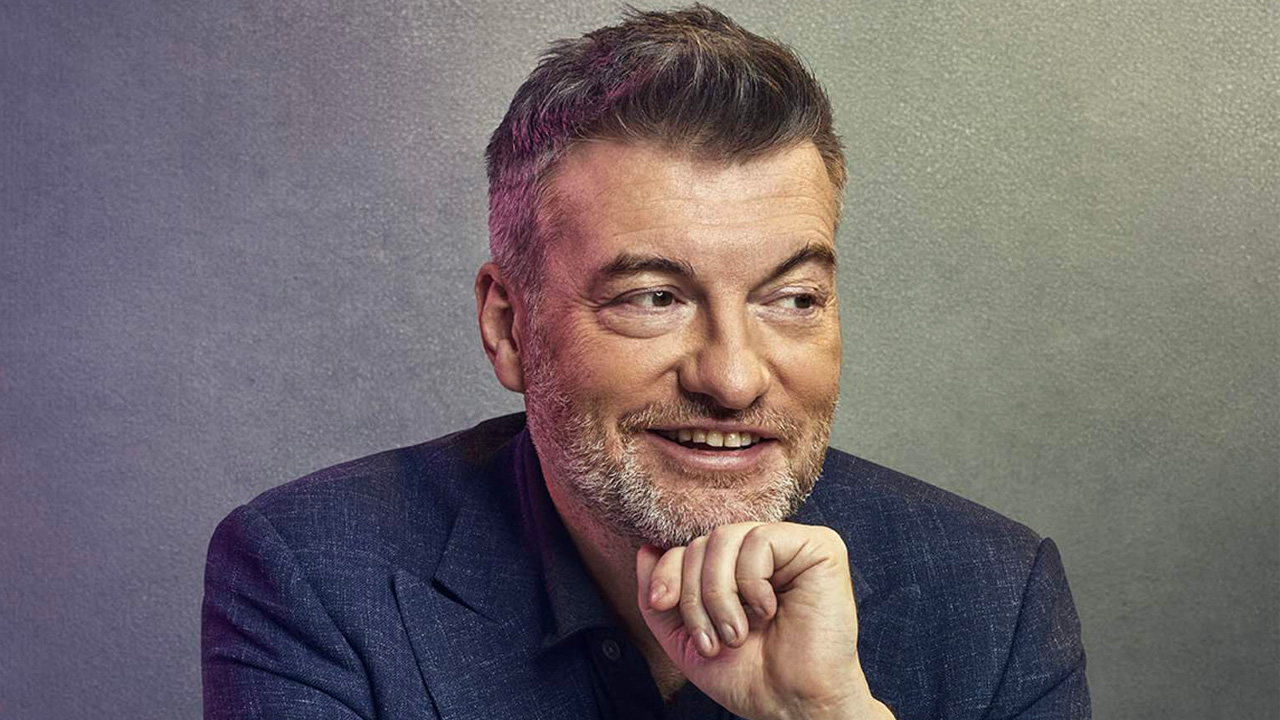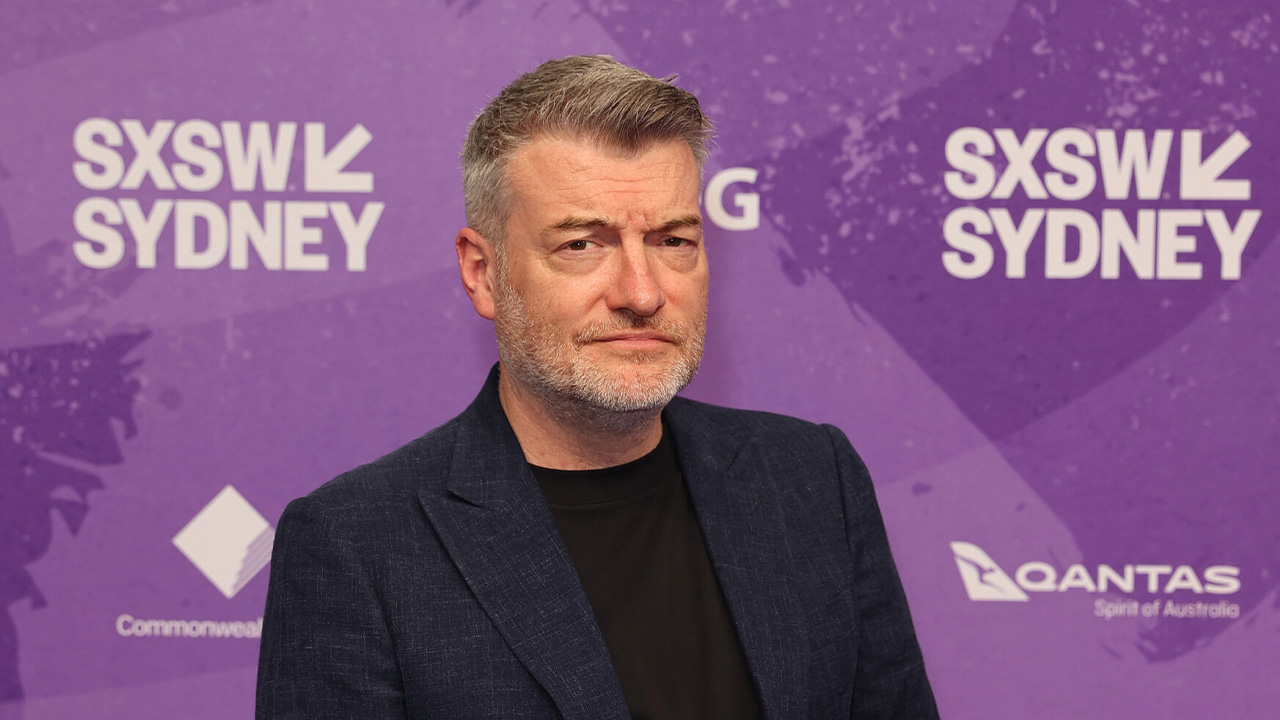Talking Black Mirror and AI with Charlie Brooker at SXSW Sydney

With the first edition of SXSW Sydney bringing Austin’s famous festival to Australia for the first time, keynote speaker Charlie Brooker chats with Travis Johnson.
The legendary cultural conference South by Southwest has left North America for the first time in its 36-year history, with the inaugural edition of Southern Hemisphere spin-off SXSW Sydney running from October 15 – 22. Encompassing music, film, gaming, and more, it’s a festival of fresh ideas. A taste-making institution that showcases the bleeding edge of culture and technology, it’s a celebration of innovation.
So, there’s a certain irony in the fact that one of the keynote speakers is most famous for creating one of the most dystopian science fiction visions of our time. Netflix’s anthology series Black Mirror is landmark TV: a savvy, cynical speculative horror series that examines how technology impacts our lives, for good or ill—mostly ill, it must be said.
It’s the brainchild of broadcaster-turned-showrunner Charlie Brooker, currently making his first visit to Sydney to speak at the festival. Tonally and conceptually, the series is equal parts Rod Serling and Philip K. Dick, offering a pessimistic but on point selection of possible future catastrophes for our viewing pleasure—somewhat at odds with SXSW’s far sunnier view of tomorrow. We had to ask the architect of these apocalyptic visions what he was bringing to the SXSW table.
“My trademark happy-go-lucky, cheerful look at the world and technology, I guess?” he laughs, before explaining that he’s decided on a more relaxed Q&A session rather than a formal address. “I wouldn’t trust myself to deliver a speech. Every time somebody says you’re delivering a speech, I feel a quick stab of fear at the thought I’ve accidentally signed up to do that but luckily, I haven’t.”
But he does say that Black Mirror is often mischaracterised as being anti-technology. “I used to be a video games journalist—which is a great job when you’re in your 20s—and I’ve always loved technology. The technology that we show in Black Mirror is very seductive, usually, and where things go wrong is it will be down to human foibles. There’s usually a human being who messes things up because they’re misusing this powerful tool. So maybe that’s what I’m bringing.”

Photo by Brendon Thorne/Getty Images for SXSW Sydney
The problem with technology, he continues, is not the technology itself, but the people who wield it. “As humans we go through a period of flailing around when a sufficiently powerful new technology comes along. It’s like we’ve suddenly grown an extra limb, which is incredibly useful, but we don’t know how to operate it, so we’re sort of smacking things off the shelves and punching ourselves in the face all the time until we come to terms with it.”
The last big tech innovation we experienced this process in was social media, and it’s safe to say we still haven’t worked out all the kinks. But now we seem to be at the dawn of the AI age, with the sudden propagation of large language models and generative art programs sending shockwaves through the creative industries. Naturally, AI is a popular topic on the SXSW Sydney program, with various panels prognosticating on what this sudden innovation might mean for the future of creative work.
For his part, Brooker sees both pros and cons. “I can see lots of benefits, and I can see the danger from a writer’s perspective—the scary thing is you imagine yourself getting completely replaced as a creative writer. I don’t think that’s likely to happen particularly quickly—he said naively—partly because I think it’s not that good. It doesn’t really generate actual original material yet—it’s all derivative. What use I can see for writers is the notion of it being a bit like a conversational Google, where you could sit there and go, ‘I’m thinking of a story about a Victorian chimney sweep. What might a Victorian chimney sweep eat for his breakfast?’
“But the danger is that execs start getting it to churn out bad first drafts of things and then hiring humans in to make it usable. That’s scary. And then more widely, I think there’s so many things it could do that we’re only just wrapping our heads around that. And the problem is, it’s an incredibly powerful tool and it’s very easy for us to misuse it.”

S6E1: Joan is Awful
But accurately predicting the future has never been Black Mirror’s main aim. “We don’t tend to be that ‘hard sci-fi’,” he says. “It tends to revolve around a fairly grounded human drama.” However, he admits there has been the odd occasion when production had to scramble to stay ahead of the technology curve.
“We did an episode called ‘Joan is Awful’, which revolves around a deepfake AI-generated TV show, effectively, and I remember thinking we need to do this now because if we do it in two years’ time, we might be competing against a load of deepfake AI-generated TV shows. So, sometimes you do sort of feel like we could be outpaced by reality, but generally speaking, I think a lot of the stuff we tend to highlight is kind of magic. It’s that thing about, you know, sufficiently advanced technology being indistinguishable from magic.”


















